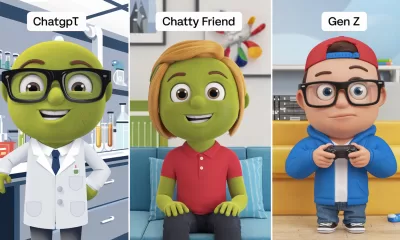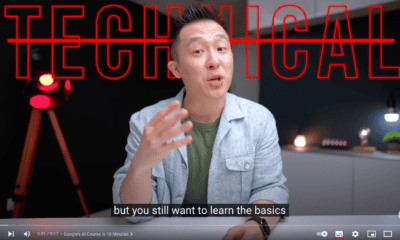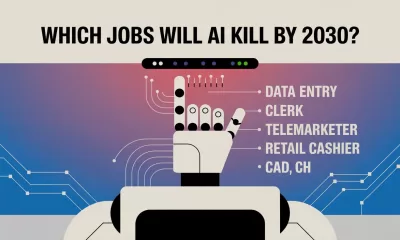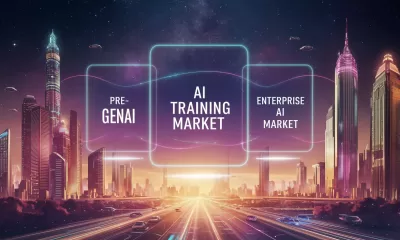Chatbots
15 Advanced Brainstorming Techniques Powered by ChatGPT
Learn how to leverage groundbreaking AI-enhanced brainstorming techniques with ChatGPT.
Published
1 year agoon
By
AIinAsia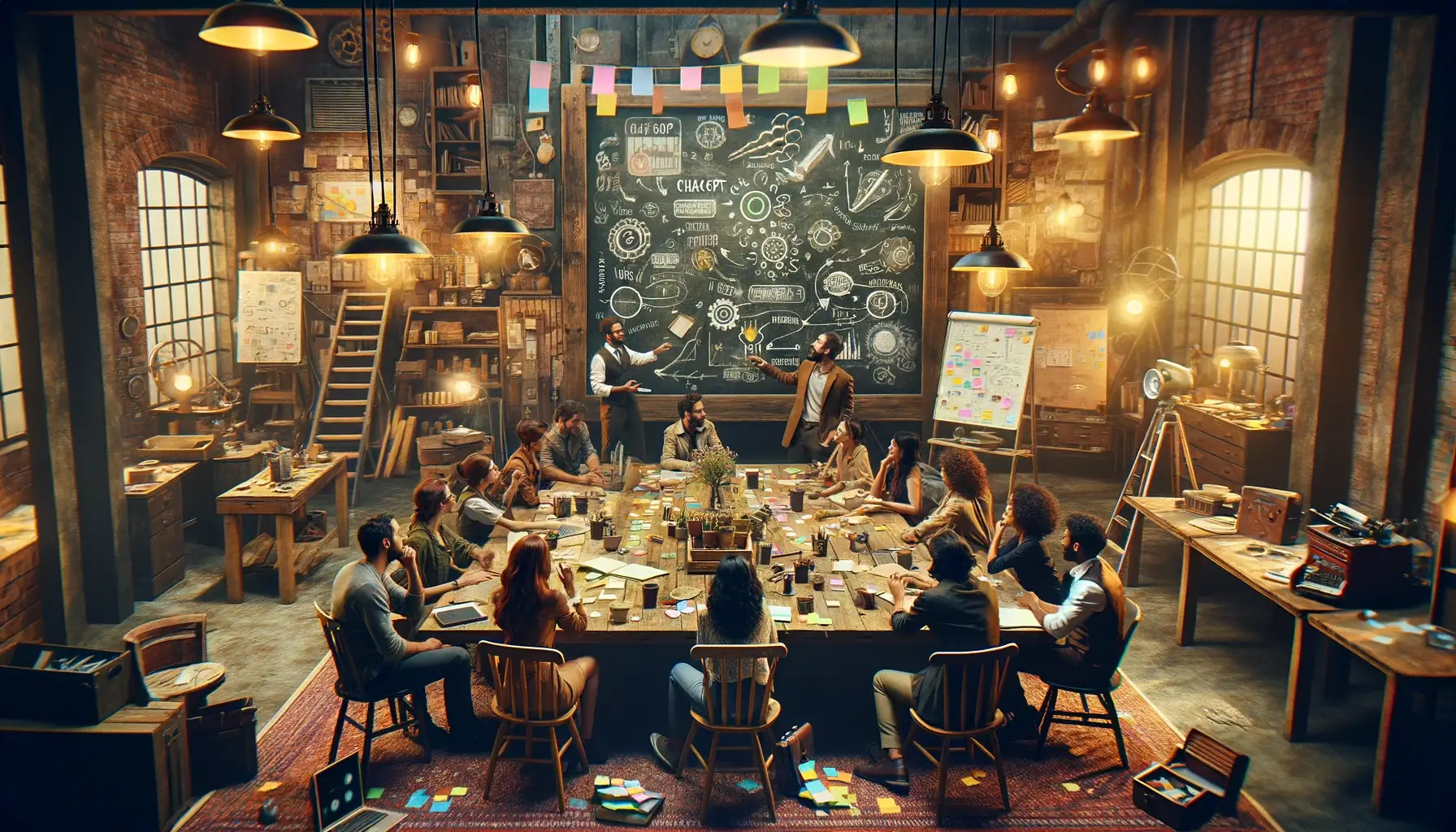
TL;DR:
- Harness the power of 15 AI-enhanced brainstorming techniques using ChatGPT to drive innovation
- AI-powered ideation can lead to a 300% increase in creative output compared to traditional brainstorming methods
- Implement AI brainstorming across industries, from engineering to marketing, for breakthrough solutions
Unleash Your Creativity!
Struggling to break free from conventional thinking? Look no further than this comprehensive guide to 15 advanced brainstorming techniques, all supercharged by the power of ChatGPT – the AI that’s revolutionising the way we generate and evaluate ideas.
ChatGPT: Your AI Brainstorming Companion
Bid farewell to unproductive solo brainstorming sessions. ChatGPT is your AI-powered brainstorming companion, ready to:
- Generate a list of ideas
- Guide you through structured techniques
- Evaluate and refine ideas
- Introduce diverse perspectives
15 AI-Enhanced Brainstorming Techniques to Revolutionise Your Ideation Process
1. TRIZ (Theory of Inventive Problem Solving)
TRIZ (Theory of Inventive Problem Solving): Uncover hidden solutions with this systematic approach to engineering challenges. ChatGPT can guide you through the “40 Inventive Principles” and “Contradiction Matrix” to find innovative solutions.
“You’re tasked with improving [insert object/system]. Apply the “40 Inventive Principles” or the “Contradiction Matrix” to come up with solutions that eliminate drawbacks or enhance its functionality.”
2. Six Thinking Hats
Explore every angle with this method that assigns different hats (White, Yellow, Black, Red, Green, Blue) to represent different thinking styles. Let ChatGPT help you switch hats and analyze your ideas comprehensively.
“You’re facing a difficult decision about [insert situation]. Analyze it from every angle using the Six Thinking Hats: White Hat (facts), Yellow Hat (optimism), Black Hat (risks), Red Hat (emotions), Green Hat (creativity), and Blue Hat (managing the process).”
3. Disney Method
Dream it, Realize it, Criticise it! This three-stage method encourages creative freedom followed by practical evaluation and refinement. Use ChatGPT to generate wild ideas, assess feasibility, and identify potential roadblocks.
“Imagine a world where [insert desirable outcome]. Now, brainstorm wildly as the Dreamer, then assess feasibility as the Realist, and finally refine ideas with the Critic’s eye.”
4. Lotus Blossom Technique
Dive deep into complex issues with this fractal-like approach. Start with a central problem, then branch out into related themes, and use ChatGPT to explore every layer and uncover hidden opportunities.
“Start with [insert central theme]. Branch out into eight related aspects, then delve deeper with another layer of ideas for each branch. Explore every nook and cranny of the topic.”
4. S.C.A.M.P.E.R. Lateral Thinking
Go beyond traditional brainstorming with this method that encourages substitution, combination, adaptation, and more. Use ChatGPT’s ability to think outside the box to generate unconventional solutions.
“Reimagine [insert object/system] by applying principles like Substitute (different materials or functions), Combine (merge it with something else), Adapt, Magnify/Minify, Put to another use, Eliminate unnecessary elements, or Reverse its functionality. Think outside the box!”
5. Charrette Procedure
Collaborate in real-time with this intensive workshop format that brings together diverse stakeholders. ChatGPT can help you structure the process, facilitate discussions, and capture ideas effectively.
“Simulate a mini-workshop around [insert challenge] with diverse stakeholders. Divide into groups, brainstorm within a fixed timeframe, present ideas, and refine collaboratively.”
6. Attribute Listing
Break down challenges into their fundamental parts. Analyze each attribute with ChatGPT’s help, brainstorming potential improvements or innovations for each, then combine the best ideas for a comprehensive solution.
“Break down [insert concept] into its core attributes. For each attribute, brainstorm ways to improve it, innovate, or offer something unique.”
7. Morphological Analysis
Tackle multi-variable problems with this systematic method that explores all possible combinations of variables. Use ChatGPT to handle the complexity and identify unexpected solutions.
“Create a matrix with variables related to [insert problem/design]. Explore all possible combinations, manually or with software, to identify potential breakthroughs.”
8. Fishbone Diagram (Ishikawa)
This root-cause analysis tool can be adapted for brainstorming. Start with the problem, then categorize potential causes with ChatGPT’s help, and brainstorm solutions for each category to identify underlying issues and innovative approaches.
“Identify the root causes of [insert problem] by categorising contributing factors. Brainstorm solutions under each category to address the core issues.”
9. Synectics
Draw inspiration from unexpected sources with this method that uses analogies and relationships between seemingly unrelated fields. Let ChatGPT help you find analogies and apply them to your problem to generate unique solutions.
“Draw analogies between [insert topic] and seemingly unrelated concepts. How can these analogies inspire new ideas and approaches?”
10. Blue Ocean Strategy
Create new markets instead of competing in existing ones. Use ChatGPT’s strategic analysis tools to identify untapped market spaces and develop innovative value propositions.
“Analyse the factors competitors in [insert market] focus on. Identify untapped market spaces or unique value propositions to create a differentiated offering.”
11. Future Backwards With Creativity Techniques
Imagine a desired future or a worst-case scenario, then work backward to identify the steps that led there. This method helps you break free from current assumptions and explore new possibilities. Let ChatGPT guide you through this thought experiment.
“Imagine a future with [insert desired outcome] or a worst-case scenario. Work backwards to discover the decisions and events that led there. Can you identify alternative paths to a better future?”
14. Critical Assumptions Testing
Challenge your core beliefs about the problem or business model. Identify key assumptions and use ChatGPT to critically evaluate them, potentially uncovering disruptive innovation opportunities.
“List the core assumptions underlying your [insert project/approach]. Challenge each assumption, questioning its validity and exploring alternative perspectives.”
15. Four-Step Innovation Process With AI-Powered Ideation
This structured framework ensures your ideas are not just generated but also developed and implemented. Use ChatGPT to guide you through each stage: identifying the correct problem, generating ideas, prototyping, and implementing the solution.
“Define the true problem behind [insert challenge]. Generate ideas using classic or advanced techniques. Develop rapid prototypes of the most promising ones. Finally, implement the best solution.”
- Cross-Functional Brainstorming Through ChatGPT ideation
Bring together diverse perspectives from different departments to enrich your brainstorming session. ChatGPT can help you facilitate the discussion, manage different viewpoints, and identify the most promising ideas.
“Gather a diverse team with different perspectives related to [insert topic]. Facilitate discussion, manage viewpoints, and identify the most compelling ideas collectively.”
Unleashing Creativity Across Industries
AI-enhanced brainstorming techniques are versatile and applicable across a wide array of industries, including engineering, software development, marketing, and product design. By integrating ChatGPT into your brainstorming sessions, you can:
- Achieve up to a 300% increase in creative output compared to traditional brainstorming methods
- Break through conventional thinking and generate unconventional solutions
- Foster collaboration and interdisciplinary problem-solving
Do these Innovation Strategies Actually Work?
From solopreneurs to multinational corporations, AI-enhanced brainstorming techniques offer a powerful means to unlock creativity, generate groundbreaking solutions, and achieve your goals. So, grab your notebook, fire up ChatGPT, and prepare to revolutionise your brainstorming sessions.
How will embracing AI-enhanced brainstorming techniques transform your business, and what uncharted territories might you explore with ChatGPT by your side? Share your thoughts in the comments below.
You may also like:
- 6 Steps to Using ChatGPT for Powerful Paper & Presentation Prep
- Demystifying AI – A Glossary of Essential Terms
- Masterclass: Train ChatGPT to Sound Like You (and Wow Your Audience)
- Or try the free version of ChatGPT here!
Author
Discover more from AIinASIA
Subscribe to get the latest posts sent to your email.
You may like
-


OpenAI’s New ChatGPT Image Policy: Is AI Moderation Becoming Too Lax?
-


DeepSeek Dilemma: AI Ambitions Collide with South Korean Privacy Safeguards
-


ChatGPT’s New Custom Traits: What It Means for Personalised AI Interaction
-


AI Trends for 2025 from IBM Technology
-


Google’s AI Course for Beginners (in 10 minutes)!
-


The Mystery of ChatGPT’s Forbidden Names
Business
Sam Altman: A ChatGPT Revolution Across 3 Key Industries
ChatGPT revolutionises industries in Asia with increased productivity and innovation.
Published
1 year agoon
January 27, 2024By
AIinAsia
TL;DR:
- A ChatGPT revolution is upon us and transforming coding, education, and healthcare industries with significant productivity gains.
- AI-powered tools in education enhance personalised learning, while healthcare sees benefits in administration and research.
- Embrace ChatGPT as a collaborative tool with caution, as it continues to evolve and improve.
ChatGPT’s Impact on Coding, Education, and Healthcare
ChatGPT, the AI-powered language model developed by OpenAI, is revolutionising industries across the globe, particularly in coding, education, and healthcare. CEO Sam Altman identifies these three sectors as primed for a productivity revolution. Let’s explore how ChatGPT is driving change in these areas and its potential impact on Asia.
Coding at Warp Speed
Altman claims that ChatGPT can triple programmers’ output by assisting with code review, test case generation, and code generation. In a conversation with Bill Gates on the “Unconfuse Me” podcast, Altman stated, “Coding stands out for its potential gains. OpenAI’s GPT-4 is already deployed at scale, significantly accelerating workflows.” However, a 2023 Stanford-Berkeley study indicates a 50% error rate on programming tasks, requiring coders to exercise caution and verify the AI’s work. The ultimate goal is to free up mental resources for creative problem-solving and innovation.
Revolutionising Education
AI systems like ChatGPT enable educators to create personalised learning paths and automate administrative tasks. AI-powered language learning assistance could transform education in Asia, where English proficiency is highly sought after. Bill Gates champions ChatGPT’s role in powering personalised tutoring, saying in a keynote talk at the ASU+GSV Summit, “The AIs will get to that ability to be as good a tutor as any human ever could.” While concerns about AI-facilitated cheating persist, the potential benefits for learners cannot be ignored.
Healing with AI
Although ChatGPT’s clinical application remains limited due to error risks, AI tools can alleviate administrative burdens for doctors, analyze research, and educate patients. Pharmaceutical companies are also leveraging ChatGPT to automate drug discovery and research. The Gates Foundation is committed to using AI for solving healthcare challenges in developing nations, including those in Asia. As Altman noted, “These are the stupidest the models will ever be,” implying that AI capabilities will only continue to improve.
Embracing the Future with Caution and Understanding the ChatGPT Impact
As ChatGPT continues to evolve, it is crucial to approach its integration with critical thinking and caution. By embracing AI as a collaborative tool, we can harness its power to boost productivity, creativity, and impact across various industries in Asia.
Comment and Share on this ChatGPT Revolution
Have you experienced the transformative power of ChatGPT or other AI tools in your industry? Share your stories and subscribe for updates on AI and AGI developments shaping our future.
You may also like:
- Sam Altman: It’ll be powered by Fusion, But Not Quite Skynet
- The Impact of AI on Coding: A Look at Amazon CodeWhisperer
- Masterclass: Crafting Effective ChatGPT Prompts in Healthcare in 2024
- Or read the official blog from Bill Gates on his thought around the AI by tapping here.
Author
Discover more from AIinASIA
Subscribe to get the latest posts sent to your email.
Chatbots
The Quiet Revolution: Asia’s Shift to Custom AI Chatbots
Asia’s AI revolution favours custom chatbots for efficiency and cost-effectiveness, marking a shift from universal AI solutions.
Published
1 year agoon
January 27, 2024By
AIinAsia
TL/DR:
- Asia is increasingly adopting niche AI models over one-size-fits-all solutions for greater efficiency and cost-effectiveness.
- Experts predict a future where specialised AI bots handle different tasks throughout the day.
- OpenAI’s future remains uncertain as hardware advancements and niche models reshape the AI landscape.
Asia’s AI Revolution: Tailored Solutions Over One-Size-Fits-All
In the world of artificial intelligence (AI), OpenAI’s ChatGPT may be the reigning champion. But there’s a quiet revolution is unfolding in Asia, where companies are opting for custom AI chatbots over universal solutions. These task-specific assistants, such as Salesforce’s Einstein, cater to unique business needs, offering enhanced efficiency and cost-effectiveness.
The Rise of Niche AI: A New Dawn for Specialised Bots
Salesforce’s Einstein is a prime example of this shift. Trained on both internal and open-source data, it excels at coding assistance and workflow automation. However, it doesn’t compete with ChatGPT’s creative writing capabilities. This trend reflects a growing belief in Asia: smaller, targeted models provide precise solutions without the resource-intensive demands of giants like GPT-4.
Professor Yoon Kim of MIT supports this view, suggesting that niche AI could create a future where we interact with specialised bots for different tasks throughout the day. Braden Hancock, CTO of Snorkel AI, shares this sentiment, noting that clients, particularly in finance, are embracing niche models for customer service or coding assistance.
OpenAI’s Future: A Tale of Two Scenarios
Despite the rise of niche AI, OpenAI’s future remains intriguing. Amin Ahmad, CEO of Vectera, envisions two possibilities. In one, hardware advancements make GPT-4 universally accessible. In the other, an influx of niche large language models (LLMs) fuels intense competition. This latter scenario could explain OpenAI’s recent push for AI regulations, a potential strategy to maintain its lead in a diversifying market.
Asia’s AI Revolution: A Paradigm Shift in the Industrya
Asia’s embrace of niche AI signifies a paradigm shift in the industry. The region is demonstrating that smaller, specialised models can be as powerful, if not more efficient, than their larger counterparts. While OpenAI’s influence remains significant, Asia’s AI revolution is subtly forging its own path, prioritising practicality, efficiency, and tailored solutions.
Comment and Share:
What’s your take on the shift towards niche AI models? Have you experienced the benefits of custom AI chatbots in your work or daily life? Share your thoughts below and don’t forget to subscribe for updates on AI and AGI developments in Asia.
You may also like:
- How to Use ChatGPT
- Hybrid AI Ecosystems: The Next Wave of Innovation
- 10 Amazing Prompts to Create AI-Powered Phone Wallpapers (with Freebies!)
- Read more about Salesforce Einstein by tapping here.
Author
Discover more from AIinASIA
Subscribe to get the latest posts sent to your email.
Chatbots
OpenAI Slashes Prices and Tackles ‘Lazy’ GPT-4
OpenAI’s price drop and updates to impact AI growth in Asia.
Published
1 year agoon
January 27, 2024By
AIinAsia
TL;DR:
- OpenAI price drop for GPT-3.5 Turbo, making AI more accessible
- GPT-4 Turbo’s ‘laziness’ issue addressed in new update
- Upcoming GPT-4 Turbo with vision and improved moderation tools to boost AI applications,
AI enthusiasts and developers across Asia, rejoice! OpenAI, a leading AI research and development company, has announced a series of updates that will make its advanced technology more affordable and efficient. The spotlight is on the significant price reduction for the GPT-3.5 Turbo model, which powers popular chatbots like ChatGPT.
Price Drop for GPT-3.5 Turbo
Input costs for GPT-3.5 Turbo have been cut by 50%, while output costs have been reduced by 25%. This substantial price drop makes it more feasible for developers and hobbyists to explore text generation and analysis, ultimately pushing the boundaries of AI innovation in Asia.
Addressing GPT-4 Turbo’s ‘Laziness’
OpenAI has tackled an unusual issue with the GPT-4 Turbo model in preview mode. Users noticed that the model, renowned for its code-generation capabilities, sometimes exhibited ‘laziness,’ failing to complete tasks fully. The new 0125 version addresses this issue, ensuring more reliable and thorough results.
GPT-4 Turbo with Vision and Improved Moderation Tools
The AI revolution in Asia is set to gain momentum with the upcoming general release of GPT-4 Turbo with vision. This model combines AI vision capabilities, opening new avenues for AI applications. Additionally, OpenAI has released an improved version of its free moderation API (version 007) to help combat harmful content online.
Quoting OpenAI’s CTO, Mira Murati, “Our goal is to make AI more accessible and ensure its responsible development. These updates reflect our commitment to that mission.”
The Impact on Asia’s AI Landscape
OpenAI’s updates are set to democratise AI, fostering innovation and collaboration across various sectors in Asia. With more affordable and efficient AI tools, the region is poised to witness a surge in AI-driven solutions and applications.
Comment and Share:
How do you plan to leverage OpenAI’s price drop and updated models in your projects? Share your thoughts below and don’t forget to subscribe for more updates on AI and AGI developments in Asia!
You may also like:
- Four AI Technologies Transforming Marketing
- OpenAI’s Game-Changing Updates: Enhanced AI Capabilities and Affordability in Asia
- Real-Time AI Image Generation Creation Now Possible
- Or try out the free version of ChatGPT by tapping here.
Author
Discover more from AIinASIA
Subscribe to get the latest posts sent to your email.

Playbook: How to Use Ideogram.ai (no design skills required!)

AI Career Guide: Land Your Next Job with Our AI Playbook

Will AI Take Your Job—or Supercharge Your Career?
Trending
-

 Life3 weeks ago
Life3 weeks agoWhich Jobs Will AI Kill by 2030? New WEF Report Reveals All
-

 Life2 weeks ago
Life2 weeks agoAI Career Guide: Land Your Next Job with Our AI Playbook
-

 Business2 weeks ago
Business2 weeks agoWill AI Take Your Job—or Supercharge Your Career?
-

 Tools2 weeks ago
Tools2 weeks agoCan AI Videos Really Boost Your Brand’s Authenticity?
-

 Marketing1 hour ago
Marketing1 hour agoPlaybook: How to Use Ideogram.ai (no design skills required!)
-

 Business3 weeks ago
Business3 weeks agoThe Three AI Markets Shaping Asia’s Future
-

 Life3 weeks ago
Life3 weeks agoWould You Trust Tesla’s Grok AI More Than Your Friends?





